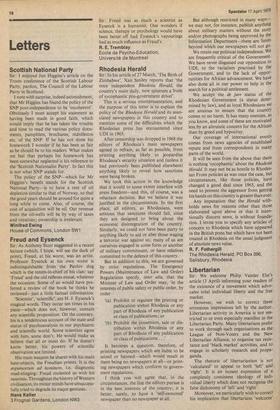Rhodesia Herald Sir: In his article of 27 March, 'The
Birth of Zimbabwe', Xan Smiley reports that 'the once independent Rhodesia Herald, the country's main daily, now splutters a froth of sycophantic pro-government drivel'.
This is a serious misrepresentation, and the purpose of this letter is to explain the policy of the Rhodesia Herald and its associated newspapers in this country and to mention some of the difficulties which the Rhodesian press has encountered since UDI in 1965.
After censorship was dropped in 1968 the editors of Rhodesia's main newspapers agreed to refrain, as far as possible, from printing anything likely to jeopardise Rhodesia's security situation and (unless it had previously been .published elsewhere) anything likely to reveal how sanctions were being broken.
We took this action in the knowledge that it would to some extent interfere with press freedom—and this, of course, was a reluctant decision. But we believe it was justified in the circumstances. In the first place, all editors, as Rhodesians, were anxious that sanctions should fail, since they are designed to bring about the economic disintegration of the country. Similarly, we could not have been party to anything likely to aid or abet those waging a terrorist war against us; many of us are ourselves engaged in some form or another of military commitment, or have relatives committed to the defence of this country.
But in addition to this, we are governed by strict regulations. The Emergency Powers (Maintenance of Law and Order) Regulations specify, inter alia, that the Minister of Law and Order may, 'in the interests of public safety or public order, by order
'(a) Prohibit or regulate the printing or publication within Rhodesia or any part of Rhodesia of any publication or class of publications; or `(b) Prohibit the possession, sale or distribution within Rhodesia or any part of Rhodesia of any publication or class of publications . .
It becomes a question, therefore, of printing newspapers which are liable to be seized or banned—which would result in there being no newspapers at all—or printing newspapers which conform to government regulations.
I think you will • agree that, in the circumstances, the line the editors pursue is in the best interests of the country; it is better, surely, to have a 'self-censored' newspaper than no newspaper at all. But although restricted in many ways— we may not, for instance, publish anything about military matters without the storY and/or photographs being approved by the Information Department—there are limits beyond which our newspapers will not go.
We retain our political independence. We are frequently critical of the Government. We have never disguised our opposition to UDI, to the racialism practised by the Government, and to the lack of opportunities for African advancement. We have also done all in our power to help in the search for a political settlement.
We accept the de lure status of the Rhodesian Government (a status determined by law), and as loyal Rhodesians we are anxious to ensure that the country comes to no harm. It has many enemies, as you know, and some of these are motivated less by an altruistic concern for the African than by greed and hypocrisy.
Our coverage of international events comes from news agencies of established repute and from correspondents in manY parts of the world.
It will be seen from the above that there is nothing 'sycophantic' about the Rhodesia Herald. It may not be as hostile to Rhodesian Front policies as was once the case, but circumstances, like those policies, have changed a good deal since 1965, and the need to prevent the aggressor from getting his hands on this country is greater than ever.
Any imputation that the Herald withholds news fbr reasons other than those elaborated upon above or that it intentionally distorts news, is without foundation. I invite you to specify any articles of concern to Rhodesia which have appeared in the British press but which have not been treated in Rhodesia on the usual judgment of absolute news value.
R. F. Fothergill The Rhodesia Herald, PO Box 396, Salisbury, Rhodesia


































 Previous page
Previous page